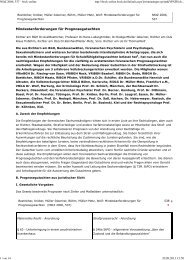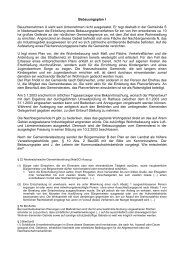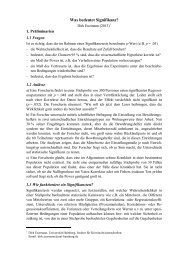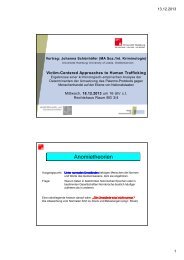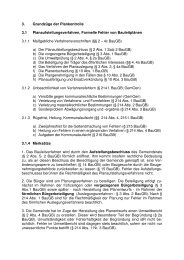Sessar Porto Problems criminology has with criminal law
Sessar Porto Problems criminology has with criminal law
Sessar Porto Problems criminology has with criminal law
You also want an ePaper? Increase the reach of your titles
YUMPU automatically turns print PDFs into web optimized ePapers that Google loves.
5<br />
140; Luhmann 1989, 37). Science too will not let its autonomy of defining truth be questioned<br />
by any other system or field as the standards of scientific operations derive from science itself<br />
(Kaplan 1964, 6).<br />
This somewhat complex theoretical construction regarding the inherent gap between science<br />
and politics is best illustrated by a statement of the Canadian political scientist Michael Ignatieff.<br />
Though at first a supporter of the war in Iraq, Ignatieff later came to regret his initial<br />
stand: "I have learned that a rational political judgment is something different to a rational<br />
judgment in the intellectual life" (Süddeutsche Zeitung, August 8, 2007, 7). The significance<br />
of this phrase lies in the incompatibility of political rationality and scientific rationality, not in<br />
the distinction between rationality and irrationality which can be the problem <strong>with</strong>in each of<br />
the respective systems. An old statement of the French philosopher Gaston Bachelard supports<br />
this view; he noted that compatibility cannot exist between the scientific mind and the<br />
legal mind (cited in Bourdieu 2003, 97).<br />
4. The epistemological issue.<br />
The difficulty of communication between the systems does not mean that they operate in a<br />
manner disconnected from another. On the contrary, they “are not sealed off from their environments<br />
[the society and the other social systems; K.S.] but experience changes therein as<br />
perturbations or disturbances which affect their own operation; and … in reacting to changes<br />
in their environment, they do so in terms of their own rules for reducing the complexity of<br />
that environment and thus environmental influences are always mediated through the system’s<br />
own procedures” (Jessop 1990, 358). What does this mean for the relationship between <strong>criminology</strong><br />
and <strong>criminal</strong> <strong>law</strong>? Concerning the more general relationship between science, <strong>law</strong> and<br />
politics, Luhmann is very clear: “Politics and <strong>law</strong> seek advice from science, but there can be<br />
no talk of scientific decision making. This concerns not only the rejection of ‘unusable’ knowledge<br />
by other functions systems but also a specific increase of claims and caution on the part<br />
of science itself” (Luhmann 1998, 88).<br />
However, a distinction must be made between facts and truths. The <strong>law</strong> cannot avoid facts<br />
should "the legal conditional program dictate that certain facts, which may be determined <strong>with</strong><br />
the aid of scientific knowledge, lead to corresponding conclusions. But facts! Not truths!"<br />
(Luhmann 1998, 130), sometimes not even recommendations grounded on facts; for example,<br />
the German Council of Economic Advisers Act of 1963 explicitly forbids recommendations<br />
on the part of the advisers <strong>with</strong> regard to politico-economic or socio-political measures (section<br />
2).<br />
Even scientifically gained and politically or legally needed facts are not always feasible for<br />
internal systems goals. One reason could be the minor quality of social scientific knowledge<br />
such as unclear objectives, poor research designs or methodological weaknesses. The basic<br />
problem however lies in the epistemological limitations of the social sciences. The pursuit of<br />
truth by means of empirical investigations is endless as empirical results and their interpretations<br />
are of a preliminary nature thus providing the foundation for the next hypotheses; even<br />
the most exact descriptions or predictions are only approximate, and a perfect correspondence<br />
<strong>with</strong> observation would be suspicious rather than satisfying (Kaplan 1964, 215). Social sciences<br />
including <strong>criminology</strong> must therefore be open to new options of experiencing the world,<br />
based on different views or better methods; after all, the world <strong>has</strong> moved on in the meantime.<br />
The point is that such an “epistemological modesty” is turned against the social sciences by<br />
those who, equipped <strong>with</strong> the belief in absolute certainties, search for reasons to repel disquieting<br />
findings.<br />
This then might turn out to be the genuine explanation for the recurrent reluctance of <strong>criminal</strong><br />
policy or <strong>criminal</strong> <strong>law</strong> to adopt criminological outcomes.




